10 Things to Love About Detroit: Become Human
Decisions, decisions, decisions...

Have you ever wondered what life would be like in the future when Artificial Intelligence, androids and automated cars are the norm? Well, that’s the beauty of science-fiction. Have you ever heard the argument that Science-fiction is a precursor to Science-fact? For example, Star Trek introduced the concept of automatic sliding doors, where only manual ones had existed before. So, if something doesn’t exist now, doesn’t mean it never will.
I thought it would be fun to take a gander at some of the quirks, characters, features of the massively popular game following the release of Detroit: Become Human on the PC, and Quantic Dreams recent independence from companies like Sony (amongst others). Quantic Dream stands to publish its own games independent of third-party companies just a few years after Detroit: Become Human’s initial release on the PS4. Quantic Dream has developed a number of games designed to challenge the player one way or another and are responsible for similarly popular games such as Heavy Rain, Fahrenheit, and Beyond: Two Souls. If you have come across any of these games in the past, you might find yourself interested to check out Detroit: Become Human. If Artificial Intelligence, moral quandaries and branching narratives are your thing, this games comes highly recommended.
The game is set in the not-too-distant future of 2038 and takes the player on a journey following three main protagonists. The game offers a number of perspectives and provides a fleshed out environment for the player to explore as much or as little as they like. No matter what you do, however, the game has plenty of twists and turns.
10. Something Special for Music Lovers

Gamers everywhere argue that sometimes, the soundtrack can make or break a game. Many games, particularly atmospheric games, can often depend on music to set the mood. Others use it to enhance the experience of combat or particular environments. Nothing like an epic soundtrack to set the mood and the stakes, right?
Detroit: Become Human is somewhat different in that each of the main protagonists, Connor, Markus and Kara were given their own composers who created (with love) entire soundtracks for each character. If you want to get a handle on who a character is, you need only listen to the music that follows them on their journey. There is something operatic and magnificent about Markus (soundtrack composed by John Paesano), a character who takes on a great responsibility, and Kara (soundtrack composed by Philip Sheppard), who is fearful, protective and carries hope for a brighter future. Connor (soundtrack composed by Nima Fakhrara) embarks on a journey of self-discovery, who breaks away from what he knows and heads into the unknown.
Of course, each character faces hardships and trials of one kind or another, which are captured through the music as well as the game-play itself. Even if you would rather focus on the gameplay, you can’t deny the effect a good soundtrack can have on a person, especially when the music is as emotive as it is in Detroit: Become Human. Even if you never play the game but are looking for inspiration or new instrumental music, then I would personally recommend having a listen.
9. Motion-Capture

Detroit: Become Human doesn’t just use the actors’ faces when they create the characters (although that isn’t uncommon practice). The actors perform their roles and don’t simply lend their voices to the game. Every move and gesture the actors make is captured on camera - the reason why the animation is so flawless! The movement of each character is perfectly natural to the actor and why even micro-expressions can be captured and seen so clearly. The game took several years to make and countless man-hours not just for the actors but for the team that made the game possible.
The game is even more brilliant when you think about the script. A game as vast Detroit: Become Human means that there will be multiple choices in any given scene, including but not limited to dialogue. Some dialogue options can set the course of your journey, while others appear arbitrary at best. Of course, it’s not just the dialogue, but the delivery that counts. Would it surprise you to know that some of the actors who shared scenes in the game never even worked together on set? That was something made possible through the magic of cinematography, and that, to me, is crazy cool.
The only thing more remarkable than the acting is the minimalist sets that the actors had to work with. It makes the actor’s ability to emote even more impressive, but as a fan of the game, that’s just one person’s incredibly biased opinion.
8. Exploration - Nothing is Wasted
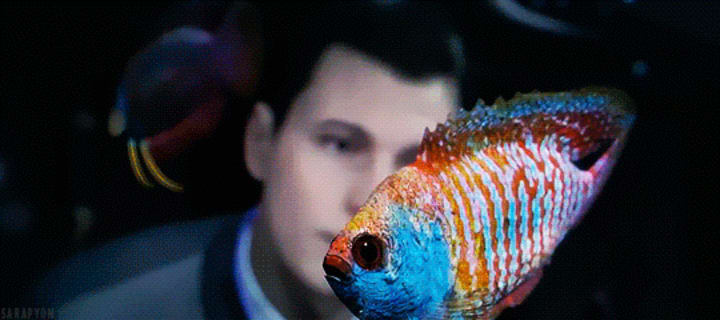
Fans of the game may already be familiar with many of the choices and discoveries you can make. Some of these discoveries you only make if you actively spend time exploring your environment. A prime example of these is a collection of magazines that can be found throughout the game which provide insight into the wider world - we’re talking insights into the future on a global scale - from political upheaval to technological advances. But, if you’re not interested in reading, you can skip the articles and check them out another time when you next find yourself on the main menu. The game is full of plenty of unlock-able extras for the curious and avid fans.
One of the most notable choices is made right at the beginning of the game. It’s an encounter easily missed, and seemingly insignificant...at least if you don’t care much for fish. Dewey the fish is famous amongst fans for a choice that becomes more and more significant as the game carries on, although you might not realise it initially.
The point is, every choice you make, big more small, has an impact in the world. Although it may not manifest itself overtly within the plot, the results are there. There is no choice in the game that is without purpose. Dewey’s life rests in your hands. So, make the choice: save the fish, or leave it. Of course, the average completionist actively has to interact with Dewey in order to unlock nodes within the game instead of simply walking on by. Avoiding Dewey will get you nowhere. So, save yourself the emotional conflict and pain and just...save the fish.
7. Your Choices Have Consequences

Now, the game, as mentioned previously has a lot going for it, especially in the way that the three main protagonists interact with the world around them. As a player, you have the option to take them down any path you see fit. We’ll get a bit more into branching narratives a little later on, but for now, we’re going to talk about the way in which your choices affect the narratives. So, the most obvious way in which the choices you make can be shown to affect the world around you is in the way that various characters feel and behave toward the protagonist (or player). Not only do you, the player, have the power to influence the opinions of your companions, but you also have the ability to affect the wider world’s opinions on large-scale issues.
Simply speaking, you can cause your friends to like or dislike you, the public to support or condemn you and assist or dismiss those you come across throughout the course of play. This is entirely up to you. Just remember that the opinion of those around you does matter...most of the time. In short, if your actions don’t affect the plot as a whole, they can and will trigger certain events. I won’t go into anything specific as I’m a firm believer in not spoiling anything for anyone, but believe me when I tell you that I was shocked at some of the outcomes that only occur when characters feel a certain way.
Now, I for one wish that public opinion could have been expanded upon and explored in more detail, but with something as massive as Detroit: Become Human, we can’t all get what we want. As it stands, your actions do affect the wider world and as a player, you have to be mindful of that, especially if you are familiar with the game and want to trigger certain events (once you’re familiar enough with the game). If you’re new to the experience, just go with the flow, you know?
6. Branching Narratives
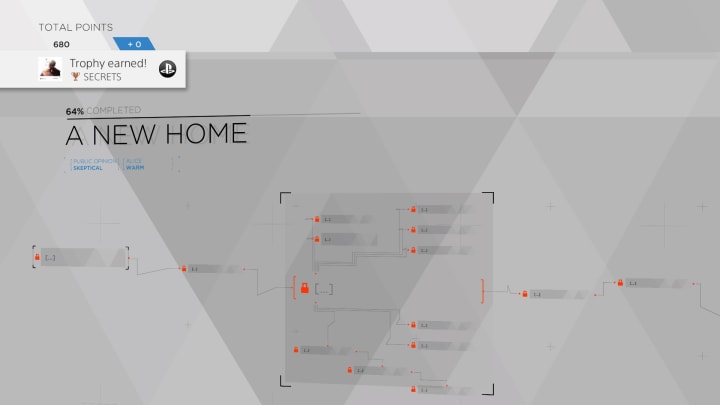
The branching narrative is probably one of my favourite things about the game apart from a number of the characters who have a special place in my heart. It often ties into the player’s willingness to explore. Examining your environment can lead to new discoveries that unlock possible paths that you can take in the future, or even something as simple as a conversation option. In my experience, unlocking these options is never necessary to progress the plot, because of the nature of the game as it can continue in any number of ways. It does, however, often offer new insight into the game which is usually more significant than any of the generic options. Even Dewey can offer insight, in his own way, a little later on. See? Not even the fish is insignificant.
Now just a small, minor, itty bitty note: it is entirely possible for you, the player, to only permanently remove not only minor characters but also any of the protagonists from the story. That’s right. You have that power. There were a number of occasions I made some choices which didn’t pan out the way I expected, but you live and learn. Of course, because of this, experimenting with the timeline is always interesting. I, personally, very much enjoyed discovering how decisions made at the beginning of the game affected the story later on. You really do have to go out of your way to see when or if something will happen sometimes, though.
Of course, there were a number of events I discovered because of my sheer incompetence and my lack of coordination. In short, there are quick-time events. A fun and exciting feature that really up the ante at times and at others, make me cry a little bit inside because sometimes, I just can’t handle the responsibility. Of course, if you come alive in moments like that, then you’ll enjoy this. Although I do have to say, if you’re not in the habit of failing, then you might want to start. This is the kind of game that sometimes rewards failure with something you never expected. So, to you, I say this: sometimes the best thing to do...is nothing!
5. Conflict

This game is not short of conflict. Moral, physical, familial, you name it, it’s probably there. The greatest and most obvious conflict is that between the androids and humans. From the beginning, we see the effect each has on the other, both positively and negatively, and is in fact the over-arching plot that blankets the world in a grim cloud of inequality and pain. That said, it is you, the player, who has the right to perpetuate the cycle of fear or alleviate it.
Let’s get real for a second and let me put something to you. You live in the year 2038. How would you like to spend your time? You would probably want to spend it doing the things you love, I assume. You would want to spend it doing art, gaming, going travelling or anything else that tickles your fancy. Wait a minute! You can buy an android. You can buy one, take it into your home, have it do all the little things you hate that just eat into your time! What a wonderful idea.
But wait. Your employer has just replaced you with a robot that doesn’t eat, sleep or think for itself. It is an obedient machine that doesn’t make mistakes. Now, you have all the free time in the world and you also don’t have any money. So, naturally, people start getting angry, and when people get angry, it generates conflict, and with conflict often comes great struggle. One way or another, the world will change, and it’s up to the player to decide how.
4. The Devil On Your Shoulder

If you’re the type of person who has trouble making difficult decisions, look no further than the devil on your shoulder. Markus (one of three main protagonists) has three faithful companions, Josh, North and Simon, who are there to help Markus every step of the way and help achieve his vision of the future. Granted, it’s their future he intends to change, so naturally, they’re all for helping.
Now, I don’t know about you, but I’m often too afraid to make the hard decisions just because I don’t want to hurt an NPC’s feelings. There are plenty of people out there who feel the same way, I’m sure. But then there are those who enjoy the chaos. If you like setting fires to feel joy, then that is definitely one thing you have the power to do. In the game. Arson is illegal and is not recommended in the real world. Burning things, to the best of my knowledge, has solved very few problems. The point is, Markus has a fantastic and morally challenging storyline and also has a walking, talking moral compass. Not a bad thing to have.
Of course, the opinions of your companions’ matter. It affects the way they treat you as a player. Josh is a philosopher at heart and advocates for one thing, and North...is the polar opposite. Both characters exist to guide the player, even give the player a little push once in a while to help them make their choices. Then, of course, there’s Simon, whose opinion doesn’t seem to matter that much, but sometimes, you do just need a supportive friend who believes in you no matter what. No, I’m not biased. But, speaking of morality...save the fish.
3. Minor Characters

Some minor characters have very little effect on the plot, although others do play a significant role. Now, anyone familiar with the game may have a differing opinion on what makes a minor character, but mine is simply this: a character who does not spend a majority of their time with any of the main protagonists and have a main supporting role. That said, even minor characters can have more effect on the plot than some of the main supporting roles. For instance, some exist to emphasise the strife between humans and androids, others exist to show you, the player, what it could be like with peace between the two species and some exist to make you go ‘aw’.
As with most things in Detroit: Become Human, everything exists for a reason, big or small. With how expansive the game is, everything is wrapped up with a neat little bow on top and very little exists within the game that really raises questions. Personally, I never looked at a character and wondered why they were there or questioned what their role or purpose was. Even if they don’t get a lot of screen time, it is evident enough in the script that they are as fleshed out characteristically as everyone else is.
These characters exist in the world to help players form their opinions and push them to make the decisions that they do. They tug on heartstrings, make you boil with rage and sometimes even laugh. If you don’t have a devil or an angel sitting on your shoulder, you have to rely on outside forces to help you. Sometimes, evidence, and not advice is what you need to help make your decisions. But remember, to get to know some of these people, exploration is key!
2. Main Supporting Characters

Each protagonist has at least one permanent companion - someone who either motivates the character or influences their course of action. These characters, one way or another, hold you, the player, accountable for your actions. Unlike minor characters, who seem to help or hinder you based either on faith or fear, these characters aren’t afraid to tell you what they think. They have a strong sense of self which is not only reflected in their personalities, but also in the way they respond to a player’s actions. Your choices are often met with approval or disapproval. What they think of you can even influence the path your narrative (and theirs) takes.
Three such characters are Alice, North and Hank. It is with these characters that players can acquire unique relationship statuses. If you want family, a partner, or a lover, do right by them and you shall achieve. Sometimes these relationships can be shoved at a player, but if the player doesn’t want to engage, the game doesn’t punish you for it...technically. Thinking about it, you have to do something mighty specific for something else not to pan out the way you might want.
I found during the course game-play that the writers went out of their way to make it possible for players to sympathise with these characters, to inspire, motivate and endear. That said, I found some easier to empathise with some more than others, but that depends on the outlook of the player. I, for one, found it difficult to do anything to jeopardise some of those relationships, and others I found exciting to challenge, and some I challenged, not because I wanted to, but because there is so much to see that it would be impossible not to.
1. The Protagonists
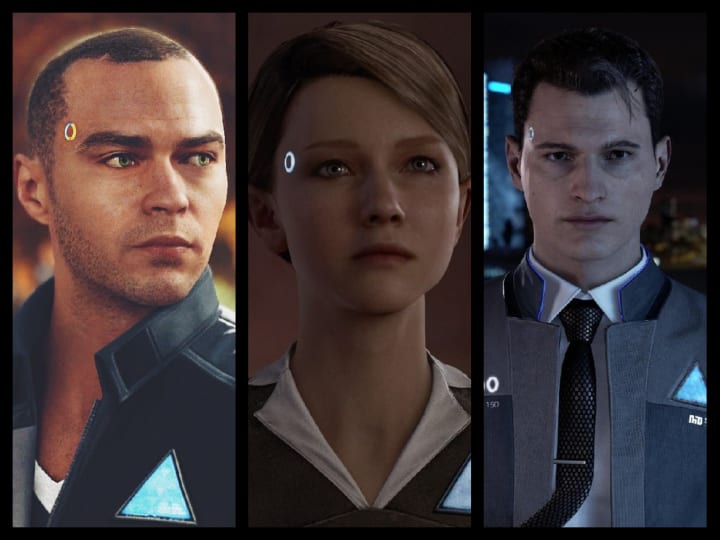
From the outset, the game uses Markus, Kara and Connor to demonstrate three things: the economic imbalance, the various relationship that humans have with technology and finally, how these things can affect life as you know it. Each character has a dramatically different background. The issues these androids face do not merely affect specific kinds of androids, but androids and humans from all walks of life. Each character is faced with varying degrees of abuse, violence and even affection.
Their journeys are varied and although their paths cross only for a brief period, it is easy to see, particularly in Kara’s case, how the actions of the other two protagonists can affect the lives of the average android. Each character comes with their own set of obstacles to overcome and their own ways of approaching the issues at hand. They challenge the player - forces them to ask, ‘what am I willing to do today?’ and ‘is this right?’. Not only does the game ask the player who they think the characters are, but also who the players themselves are. How far would you go to protect something, achieve something, or change something? Are you willing to take on the unknown, let go of what you know and break the rules?
In a game like Detroit: Become Human, obedience costs just as much as defiance. There are no right or wrong choices. There is only the journey. The result is what you make it. It is a testament to the team behind the game that every choice, every line and every action feels so natural. Every decision made does not feel alien to the characters. Nothing comes up out of the blue like a glaringly obvious contradiction to what we know - or what we think we know - about these characters. Whatever choice you make is the choice your character would make. I think all three of them have pros and cons as people, but that is the case with anyone you will ever meet. Androids, like humans, are flawed, and that’s okay.
Ultimately, the game asks one question: what makes a person human? Is it the sum of your parts, whether you were born or built? The player doesn’t necessarily have to answer that question, but they can draw their own conclusions. Whether you like the philosophy of the game, the action or the relationships, I think there is something for everyone to be had. So, 10/10 would recommend.


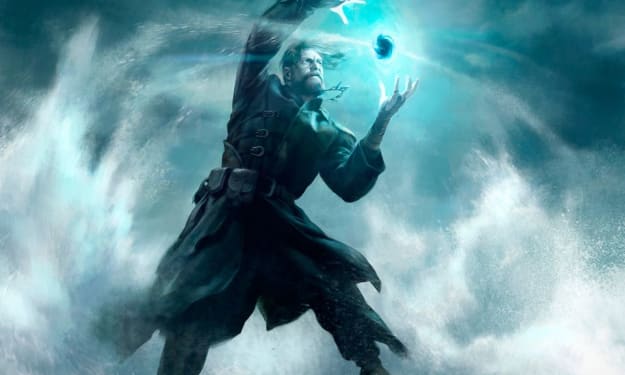
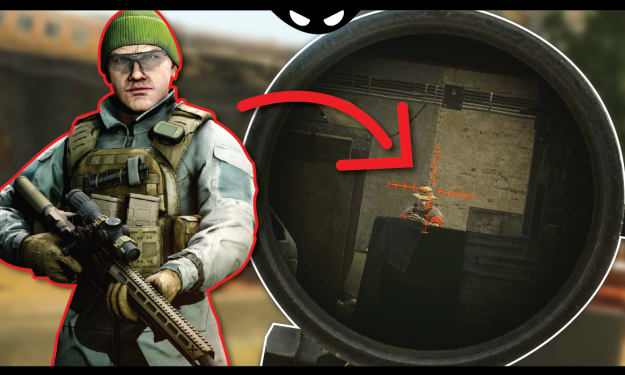


Comments
There are no comments for this story
Be the first to respond and start the conversation.